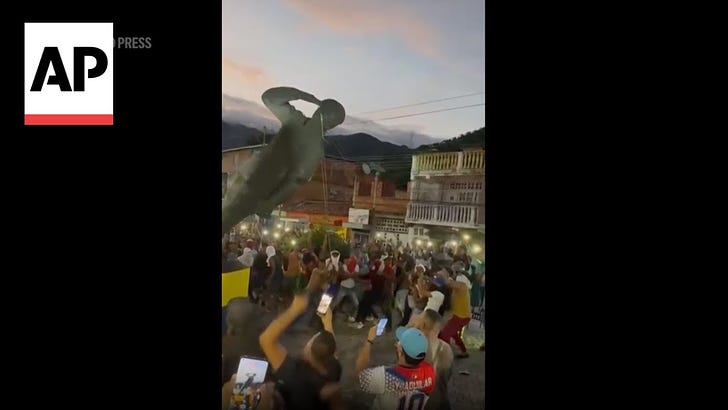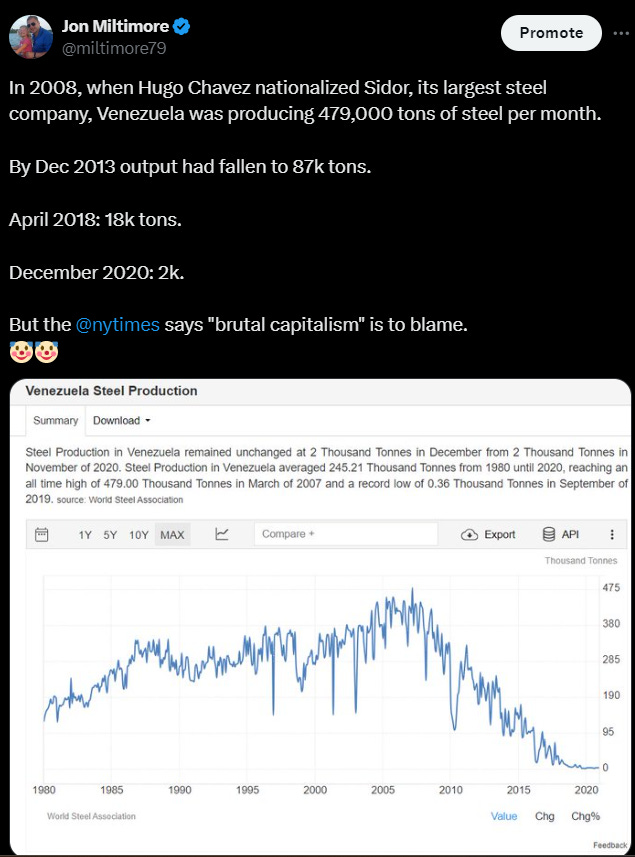The New York Times Is in Denial about Venezuela's Collapse
The New York Times blames ‘brutal capitalism’ for Venezuela’s economic disintegration. In reality, Venezuela is one of the most confiscatory and regulated economies in the world.
Outside Caracas, in the seaside city of La Guaira, Venezuelans on Monday descended on a statue of Hugo Chavez, the populist leader whose United Socialist Party of Venezuela has ruled since 2007. All that remained when they were done were chunks of concrete and some twisted rebar at the foot of a pedestal, ABC News reported.
“Yet another statue of Chávez torn down,” tweeted Antonio Mora, professor at University of Miami’s School of Communication. “Praying the end is near for the Nicolás Maduro dictatorship that has impoverished the country and sent millions into exile.”
The uprisings come on the heels of a disputed election, with Maduro’s socialist government claiming victory even though opposition leader Maria Corina Machado says her party received 73.2% of Sunday’s vote and the United States has recognized Edmundo Gonzalez as the winner of the election.
The chaos in the streets marks what could be the final days of Maduro, who rose to power following the death of Chavez in March 2013. For Venezuelans, the experience has been hell.
Over the last decade, the country has endured one of the sharpest economic declines in modern history, a period that witnessed mass hunger, 10 million percent inflation, and the exodus of an estimated 6 million people.
The suffering in Venezuela is a direct result of the policies ushered in by Chavez, who in January 2007 sent what the New York Times described as “a chilling message to foreign investors” following his electoral victory.
“All that was privatized, let it be nationalized,” Chavez declared.
Chavez made good on his word. Over the next two years, he began nationalizing industry after industry. The production of steel, agriculture, gold mining, and telecommunications were all brought under state control, as were the sectors of tourism, transportation, and banking.
The economic experiment fared no better than previous attempts to usher in utopia through central planning. Take steel. Economic data show that in March 2007, Venezuela was producing 479,000 tons of steel per month. By the end of 2013, output had fallen to 87,000 tons per month. By April 2018, monthly production had fallen to just 18,000 tons, and by the end of 2020 to 2,000.
The results should come as little surprise to anyone who’s studied economics or read history.
“Socialism in general has a record of failure so blatant that only an intellectual could ignore or evade it,” the economist Thomas Sowell once observed.
Sowell wasn’t being cheeky. Everywhere socialism has been attempted in earnest, it has failed. Evading the failures of socialism has become the primary job of its defenders.
A case in point is the New York Times, which on Sunday blamed Venezuela’s collapse on capitalism.
The socialist model that Maduro had once hailed “has given way to brutal capitalism, economists say, with a small state-connected minority controlling much of the nation’s wealth,” the newspaper reported.
It’s a shocking claim and a deeply inaccurate one. Maduro is the president of the United Socialist Party of Venezuela, which oversaw the nationalization of Venezuela’s economy.
Venezuela’s economy isn’t remotely capitalist. It’s one of the most confiscatory and regulated economies in the entire world, trailing only Cuba and North Korea. The New York Times equating capitalism with a “small state-connected minority” controlling wealth shows it doesn’t understand the definition of capitalism.
This likely explains why the New York Times offered no quote, but simply linked to another story from several years ago that quotes prominent socialist Elias Jaua.
“This is savage capitalism that erases years of struggle,” Chavez’s former vice president told the paper.
To demonstrate that “brutal capitalism” holds sway in Venezuela, the New York Times pulled a quote from a Chavez crony who sits on the board of the Socialist Party, swapped in a different adjective, and added, “economists say.” The only economist the New York Times bothered to cite in the 2020 story was Ramiro Molina of Caracas’s Andres Bello Catholic University, who said Venezuela’s floundering economy “has forced the government to become pragmatic” and abandon socialist dogmas.
This last claim is actually true. As anyone who has been following the crisis in Venezuela knows, Maduro’s government got so desperate in recent years that it turned to privatization to save its floundering economy, much like Lenin did when he embraced markets after his “War Communism” policies had failed so badly in the USSR.
That didn’t make Lenin a capitalist. Nor does it make Maduro one. The flailing tyrant is simply borrowing the script of socialist strong men of the 20th century who showed they would do anything to hold onto power.
The New York Times is free to publish its nonsense about capitalism and Venezuela’s collapse. But Venezuelans appear to know very well who the real culprits are.





Look no further than the Heritage Foundation's Index of Economic Freedom. Here are Venezuela's numbers: Overall Score - 28.1/Third-worst in the world; Property Rights Score - 0/Worst in the world; Government Integrity - 6.4/Third-worst in the world; Judicial Effectiveness - 3.3/Worst in the world; Government Spending - 96.6 - third-highest in the world. Tax Burden is also 75.9, which also isn't a pretty number.
Brutal Capitalism- oh come on! Its command economy meets crony capitalism. They’re right in a very limited sense- good or bad - this isn’t whatI see as genuine socialism ( don’t misinterpret- I have no use for socialism).But capitalism, spare me.